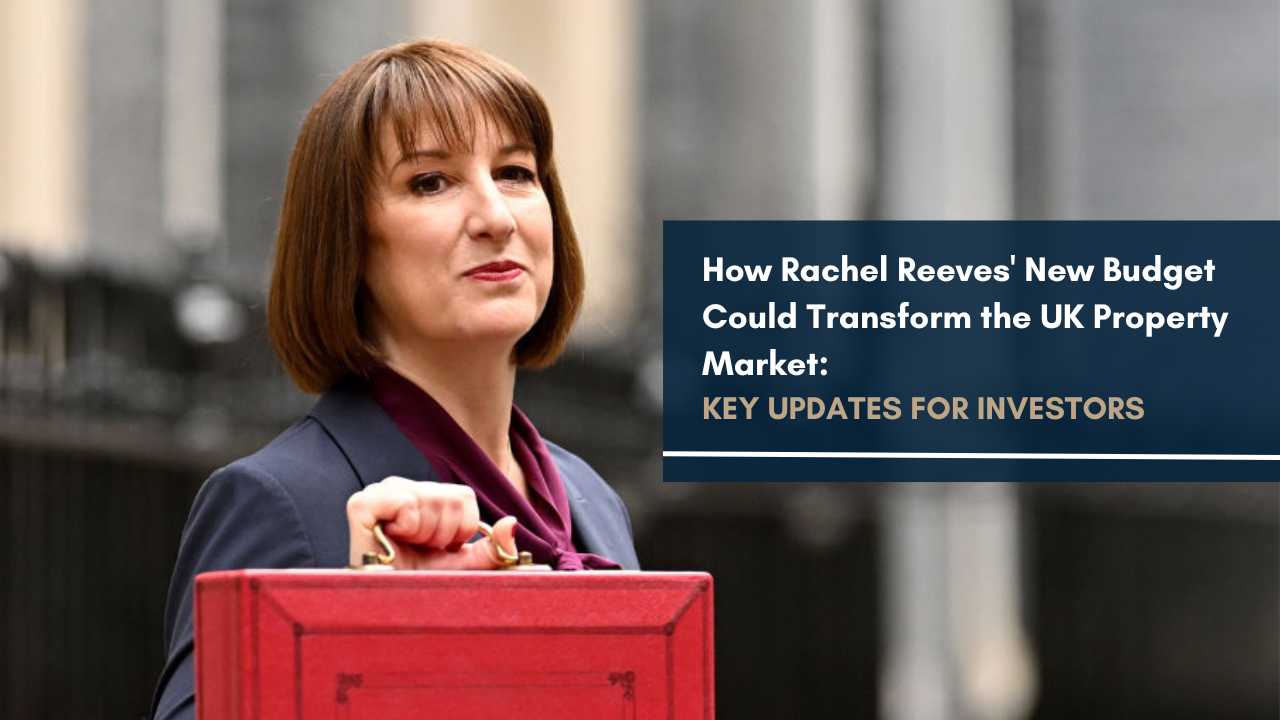If you’re considering investing in property for the first time and you’ve started doing some research online, the range of resources and information can feel overwhelming. From videos and podcasts to blog posts and TikToks, there are “experts and gurus” everywhere giving their two-pennies-worth on the best approach and “secret hacks” (or pushing you towards their latest training course).
So, amongst all this noise, where do you even start?
We’ve written this post to simplify things and provide an answer to the most common question all new investors have: how do you make money from property?
After all, you’re in this to make a return on your investment. Fortunately, there are five well-proven property investment strategies to pick from – we’ll explain each of them, and you can decide which sounds best for you.
But before we go any further, why should you listen to us?
Over the last five years, we’ve grown from a bedroom business to a multinational firm, becoming one of the UK’s leading property investment companies along the way. From our offices in London and Dubai, we’ve helped thousands of investors around the world find, purchase and make money from property.
Okay, that’s enough about us, let’s jump in.
Property Investment Planning
Before you can start making money from property, you need to take a step back and do some planning.
The only way to succeed in this sector is to have a robust investment plan in place. From your very first purchase to your exit, your investment plan will guide your decision-making and keep you on the right path.
So, what does a plan entail?
In short, it’s very similar to any business plan. The key is to keep it simple to begin.
Start with your current situation. Note down your budget, any other assets in your portfolio, your current career commitments, and your skills and expertise with property (are you good at DIY for example?).
Next, focus on your targets. What do you want to achieve? Some investors just want an additional passive income stream to supplement their main career. Others are looking to ditch the day job and build a property empire.
Finally, jot down how your journey will take you from point A to point B. Consider the time frame and funds you have available, as well as your risk appetite. For example, if you’re in your 30s and want a juicy nest egg for retirement, you can afford to move slower and more carefully than someone looking to make a quick profit within a couple of years.
The reason this is an important first step is because it will, more than anything, determine which property investment strategy is right for you. Speaking of which, let’s now turn our attention to those five strategies we mentioned.
Five Proven Strategies For Making Money From Property
Residential Buy-To-Let
The most common strategy is buy-to-let, where a residential property is bought by an investor with the intention of letting it out to tenants. Buy-to-let properties generate a monthly rental income and, typically, appreciate in value throughout ownership.
This approach is probably what springs to mind when most people think about property investing, and it’s where most investors begin their journey. But why?
The answer is that it’s very accessible – there are plenty of buy-to-let mortgage products available, meaning anyone can fund a purchase as long as they have the deposit (typically 25%).
It can also be incredibly simple. For example, you could buy a suitable property and then instruct a letting agent to manage it on your behalf. This will eat into the profit margin, but it’s ideal for those without the time, skill, or desire to manage a property, deal with tenants, fix issues, and so on.
Those who favour the buy-to-let process but are looking for something a little more hands-on may consider a House in Multiple Occupation (HMO). Here, individual rooms in a property are rented out to different tenants. HMOs generate a stronger rental yield but tend to require significantly more administration and maintenance.
Commercial Buy-To-Let
What if you take the idea behind a buy-to-let and apply it to commercial properties?
With this approach, instead of focusing on residential properties, an investor purchases a commercial property to rent to a business – for use as a shopfront, factory, office space, studio, restaurant, cafe, or whatever they require.
A considerable advantage of commercial buy-to-let is that tenants tend to take significantly longer leases than a residential alternative. Many companies deem a constantly changing address to be bad for business.
However, the downsides include the fact that such properties are generally much more expensive, financing is slightly more tricky, and some commercial landlords report that it takes much longer to find a genuine tenant to occupy the space.
Student Property
Another proven strategy, again based on the buy-to-let approach, is focusing on student property.
The student population in the UK grows tremendously every year, meaning the pool of potential tenants is continually increasing. Additionally, the demands of students are evolving, with more now preferring to pay higher rents for better quality Purpose-Built Student Accommodation (PBSA). This is especially true of international students, so pay attention to which universities attract high numbers.
Moreover, student property generates some of the strongest yields in the country, as shown by our UK rental yield map. For example, Manchester’s M14 postcode, which is dominated by students, hit an average of 12%.
However, it is worth keeping in mind that it can be much more difficult to get a mortgage for a student property (in fact, PBSA can only be bought in cash) and they don’t necessarily increase in value as quickly or strongly as standard residential properties.
Buy To Sell (Property Flipping)
Buy-to-sell is probably the second most common property investment strategy after buy-to-let. As the name suggests, it involves purchasing a property with the intention to re-sell it for a profit after a short timeframe. You may have heard it called “flipping”.
Obviously, a property doesn’t gain much value naturally in a short period, so this approach requires a good eye for spotting undervalued properties that can be significantly and quickly improved to boost their appeal and price.
Plenty of improvements can be made to a property to increase its value. A quick facelift can often add a surprising amount to the valuation, while a complete renovation can add tremendous value – especially if it includes a new extension or loft conversion.
The problem is this work is expensive. Materials, labour, engineering and architectural plans can all add up and leave little wiggle room for profit. That’s why buy-to-sell is more suited to investors with the skills, expertise and time to do as much of the work themselves – making it a very hands-on approach.
However, one of the most significant benefits of this method is that it provides a lump sum payout at the end. Additionally, the stress of dealing with tenants or managing agents is entirely removed.
A quick tip: With a buy-to-sell, a trick many investors use is to apply for planning permission on the home. Applying for planning permission can be a confusing and laborious task, and many buyers will pay a premium to purchase a home with planning permission already in place.
Property Development
A less common, but highly lucrative approach is property development. This is where an investor will build a brand-new property for the sole purpose of selling it or renting it out.
Most investors are not interested in property development due to the complexity and budgets involved.
It’s more suited to those with extensive experience or a background in the building trade, but it’s not something you should rule out entirely if you don’t have those things. You could always partner with someone who does have the required skills, for example.
Or, you could gain experience through other approaches first and look to property development in the future once you’re more confident and your portfolio can absorb the financial risks involved.
This investment strategy can deliver the greatest returns but is arguably the highest risk. Blowing the budget on the build or becoming too emotionally attached to the project can be catastrophic.
Bonus Strategy: REITs
To finish off, let’s throw in a bonus strategy: Real Estate Investment Trusts, or REITs for short.
A REIT is a publicly traded company that invests in income-generating properties. Anyone can purchase shares in a REIT, making them a shareholder. If the REIT is successful, it will distribute its profits to shareholders via a dividend payment (usually once a year). The more shares you own, the more you receive.
We only include REITs as a bonus strategy because, compared to the methods outlined above, they aren’t like property investment in the traditional sense – they’re more like picking and trading stocks.
REITs are ideal for those who would like some exposure to the property market but in a lower-risk environment.
Of course, this means the amount of money you can make is less than you would expect as a landlord or buy-to-sell investor, but it’s simple, stress-free, and accessible to practically any budget level.
Comparing The Different Strategies
<table>
Extra Tips
Property investment can sometimes feel like a minefield. There is so much misinformation online drawing investors to poor decisions. So, before we leave you, here are some final tips for making money from property.
Pay Attention To Off-Plan Opportunities
Off-plan properties are purchased before the construction is complete.
They can be bought at a discount directly from the developers, who offer lower rates in exchange for secure, early purchases.
Already, this means there is a profit margin built in once the property is complete. You could sell right away to benefit, or you could keep the property for rental income.
Don’t Expect Returns Too Quickly
Property is a long game. It takes vast amounts of planning, perseverance and patience to be successful in this industry. Investors are prone to becoming frustrated, resulting in rash, reckless decisions.
Plan Your Exit Strategy
While you might only just be getting into the investment property industry, it’s equally important to have a clear exit strategy. You need to know when and how you’ll cash out.
Your exit plan should consider market conditions, tax implications, and your long-term financial goals. For example, you might plan to sell once the property reaches a certain value, or you could aim to reduce your portfolio gradually as you near retirement.
Having a well-thought-out exit strategy ensures you can maximise your profits and avoid getting caught out (for example, by unexpected market shifts).
Diversify, Diversify, Diversify
Investors often tend to have a preferred asset class, but putting all your eggs in one basket is a risky move in any investment strategy, and property is no different.
Diversification is key to managing risk. Consider spreading your investments across different types of properties, such as residential, commercial, and student accommodation. You might also think about diversifying geographically by investing in different cities.
This will help you protect against market fluctuations. If one investment underperforms, others in your portfolio can help balance the overall returns, providing you with more stability and peace of mind.
Don’t Become Too Attached
Property is unlike many other investment types, as it is undeniably personal.
It’s inevitable you will have some emotional attachment to your properties, but try to remain logical in your decision-making when it comes to buying and selling. Properties should always align with your goals, strategy, and budget.
Working in partnership with a dedicated investment company can help remove the emotional attachment and enable you to make the most sensible decisions.
Summary
So there you have it, five proven approaches to invest in property and make money (plus a bonus).
If you would like some help with your property journey, why not reach out to our team?
We specialise in buy-to-let, so we can help you find investment properties to suit your budget, experience and aims. Get in touch using the form below to organise a free consultation, or take a look at our portfolio of properties in the UK and Dubai.
































